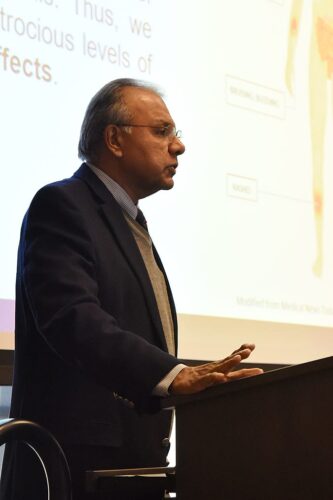New Pancreatic Cancer Treatment Developed at Duquesne Targets Only Tumor Cells
A pancreatic cancer drug synthesized at Duquesne that targets only cancer cells without damaging normal cells is proving successful in early trials.

A University research team led by Dr. Aleem Gangjee has developed a way to block the protein SHMT 2, a known cancer driver that, when overproduced in the body, is a major contributing factor in pancreatic cancer cases. Current treatments require chemotherapy, which damages both cancer and normal cells and often leaves patients feeling sick.
“We have designed drugs that transport into tumor cells only, leaving normal cells alone,” Gangjee, the Adrian Van Kaam Chair in Scholarly Excellence and distinguished professor in the School of Pharmacy, said. “By targeting only cancer cells, the treatment has little or no adverse side effects.”
Cancer cells have a transport mechanism that allows them to facilitate nutrients to enter the cell, Gangjee explained. Some transport systems are only in tumor cells, while some are found in normal and tumor cells.
“If we can design a drug with selective transport into tumor cells only, we spare the normal cells,” he said. “If we can get the drug into the tumor cell and block SHMT 2, then we have achieved success.”
Recent animal trials with the treatment have shown positive results in both early and late-stage pancreatic cancer. Gangjee said he hopes to begin pre-clinical development of the drug in the near future with Flag Therapeutics, an early-stage oncology company. He shared his findings at an American Association of Cancer Research conference earlier this year, and the results have been published in Molecular Cancer Therapeutics.
School of Pharmacy graduate students in Gangjee’s lab help design and synthesize the drug compound. Gangjee collaborates with Dr. Larry Matherly at the Karmanos Cancer Institute in Detroit, which tests the treatment, and Dr. Frank Sorgi, president and chief executive officer at Flag, which develops the drug for clinical trials.
The third-leading cause of cancer-related death in the United States, pancreatic cancer has the highest mortality rate of all major cancers, according to the American Cancer Society. For all stages combined, 91% of pancreatic cancer patients will die within five years of diagnosis and only 9% will survive more than five years.
